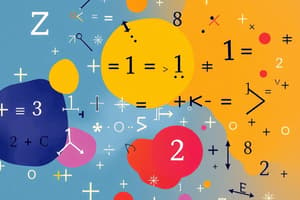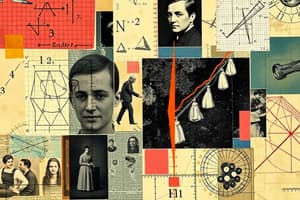Podcast
Questions and Answers
Which of the following is a key step in effective problem-solving?
Which of the following is a key step in effective problem-solving?
- Avoiding different solution strategies
- Ignoring irrelevant data
- Rushing to a solution without evaluation
- Formulating a clear problem statement (correct)
What role does mathematical reasoning play in mathematics?
What role does mathematical reasoning play in mathematics?
- It's a minor part of advanced calculations
- It requires creativity and artistic expression
- It's vital for critical thinking and using logic (correct)
- It's not important for understanding the logic behind math
Which of these is NOT a common approach used to solve complex mathematical problems?
Which of these is NOT a common approach used to solve complex mathematical problems?
- Applying logical reasoning
- Employing trial and error
- Using illogical reasoning (correct)
- Breaking the problem into smaller, simpler parts
Which of these fields heavily relies on mathematical models?
Which of these fields heavily relies on mathematical models?
How do mathematical proof methods improve understanding?
How do mathematical proof methods improve understanding?
Which branch of mathematics focuses on the study of shapes, sizes, and positions of objects in space?
Which branch of mathematics focuses on the study of shapes, sizes, and positions of objects in space?
Which concept is NOT a basic element of arithmetic?
Which concept is NOT a basic element of arithmetic?
What does algebra primarily use to represent unknown quantities?
What does algebra primarily use to represent unknown quantities?
What is the primary focus of calculus?
What is the primary focus of calculus?
Which of these branches of math is most concerned with collecting, analyzing, and interpreting data?
Which of these branches of math is most concerned with collecting, analyzing, and interpreting data?
What is a key feature of discrete mathematics?
What is a key feature of discrete mathematics?
Which fundamental property in arithmetic states that the order of numbers does not affect the result when adding or multiplying?
Which fundamental property in arithmetic states that the order of numbers does not affect the result when adding or multiplying?
What is the study of finding rates of change considered to be?
What is the study of finding rates of change considered to be?
Flashcards
Formulate a Problem Clearly
Formulate a Problem Clearly
Clearly stating a problem to identify what needs to be solved.
Identify Relevant Information
Identify Relevant Information
Identifying the crucial information needed to solve a problem.
Explore Solution Strategies
Explore Solution Strategies
Employing different methods like trial and error, logical reasoning, or a combination of both to reach a solution.
Verify Solution Validity
Verify Solution Validity
Signup and view all the flashcards
Simplify Complex Problems
Simplify Complex Problems
Signup and view all the flashcards
What is mathematics?
What is mathematics?
Signup and view all the flashcards
What is arithmetic?
What is arithmetic?
Signup and view all the flashcards
What is algebra?
What is algebra?
Signup and view all the flashcards
What is geometry?
What is geometry?
Signup and view all the flashcards
What is calculus?
What is calculus?
Signup and view all the flashcards
What is statistics?
What is statistics?
Signup and view all the flashcards
What is discrete mathematics?
What is discrete mathematics?
Signup and view all the flashcards
What is algebra?
What is algebra?
Signup and view all the flashcards
Study Notes
Fundamental Concepts
- Mathematics is a field of study encompassing the logic of quantity, structure, space, and change.
- It's a universal language used across disciplines to model and solve problems.
- Core branches include arithmetic, algebra, geometry, calculus, and statistics.
- Key mathematical structures include sets, groups, and fields.
Arithmetic
- Arithmetic deals with basic operations: addition, subtraction, multiplication, and division.
- It forms the foundation for more advanced mathematical concepts.
- Includes concepts of integers, fractions, decimals, and percentages.
- Understanding place value is crucial for arithmetic operations.
- Properties of operations (commutative, associative, distributive) simplify calculations.
Algebra
- Algebra uses symbols (variables) to represent unknown quantities.
- It provides a systematic way to solve equations and inequalities.
- Fundamental algebraic concepts include solving linear equations, quadratic equations, and systems of equations.
- Polynomials, factoring, and expanding are important algebraic tools.
- Manipulating algebraic expressions and equations is key for solving problems.
Geometry
- Geometry studies shapes, sizes, and positions of objects in space.
- Includes concepts like points, lines, angles, triangles, and polygons.
- Euclidean geometry defines shapes based on axioms and postulates.
- Non-Euclidean geometries exist, including spherical and hyperbolic.
- Measurement of geometric figures involving area, volume, and perimeter is crucial.
Calculus
- Calculus deals with continuous change and motion.
- Includes differential calculus—finding rates of change (derivatives).
- And integral calculus—finding accumulated quantities (integrals).
- Applications span optimization problems, motion analysis, and various scientific fields.
Statistics
- Statistics involves collecting, analyzing, and interpreting data.
- Descriptive statistics summarizes data using measures like mean, median, and mode.
- Inferential statistics uses data to make predictions about a larger population.
- Probabilities are fundamental in statistical analysis.
- Data visualization techniques present complex data in clear formats.
Discrete Mathematics
- Discrete mathematics deals with objects that can be counted.
- Includes topics like logic, sets, combinatorics, and graph theory.
- Applications are found in computer science, operations research, and other disciplines.
Problem-Solving Strategies
- Formulate a problem clearly.
- Identify relevant information.
- Explore different solution strategies (trial and error, logical reasoning, etc.).
- Verify the validity of solutions.
- Simplify complex problems by breaking them down into smaller parts.
Mathematical Reasoning
- Critical thinking and logical reasoning are essential in mathematics.
- Developing a systematic approach to problem-solving is crucial.
- Understanding the underlying principles of mathematical concepts is essential for effective application.
- Mathematical proof methods (direct proof, proof by contradiction) demonstrate the validity of conclusions.
Applications of Mathematics
- Mathematics finds applications across numerous fields.
- Physics, chemistry, engineering, and computer science heavily rely on mathematical models.
- Economics, finance, and social sciences use mathematical tools for analysis.
- Mathematics is essential for understanding and modeling the world around us.
Studying That Suits You
Use AI to generate personalized quizzes and flashcards to suit your learning preferences.




